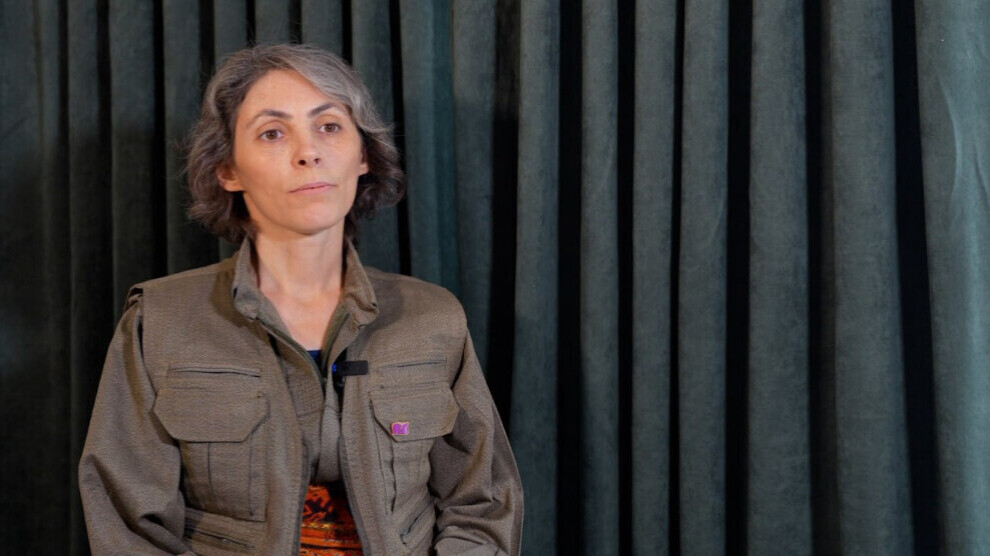Rûken Nexede on ‘Jin Jiyan Azadî’: Philosophy of freedom, equality
Rûken Nexede of KJAR said the ‘Jin, Jiyan, Azadî’ anniversary highlights women’s resistance in Iran and how the philosophy challenges repressive structures from family to society.

News Center - The anniversary of the “Jin, Jiyan, Azadî” (Woman, Life, Freedom) uprising is not merely a commemoration of a slogan or symbol, but a moment to assess achievements, analyze challenges, and understand the trajectory of social change in recent years.
“Jin, Jiyan, Azadî” has transcended its origins as a cry against repression to become a deeply rooted philosophy in women’s struggle, reshaping society from its foundations. Women’s resistance has moved beyond symbolism to evolve into a liberation project that redefines freedom and confronts patriarchy with a new intellectual and cultural framework. It is a moment of evaluation, not remembrance; a moment of construction, not mere protest.
Philosophy of freedom
Regarding the significance of the “Jin, Jiyan, Azadî” uprising anniversary for Iranian society and the achievements so far, Rûken Nexede, member of the Coordinating Council of the East Kurdistan Free Woman Society (KJAR), said: “It is a historic moment that charges us all with the responsibility to continue the struggle. This philosophy represents a radical response to domination and the destruction of humanity—a response that keeps the cry of resistance alive from Gaza and Kurdistan to Balochistan and Iran, against violations and killings.”
She added: “With the resilience and courage inherited from our mothers, we will not allow domination to continue. This philosophy is not merely a slogan, but an opportunity to live freely. It is a shared philosophy understood by the people of Iran in their own language, calling on humanity to resist oppression and guiding generations toward building free-willed individuals. Its roots extend to the Kurdish liberation movement and Kurdish women’s struggle; history has proven that women, with their love of life and freedom, shake the foundations of the patriarchal system.”
She emphasized: “The philosophy of ‘Jin, Jiyan, Azadî’ heralds a different future shaped by women through their resistance and efforts. The wars and domination policies imposed by the Iranian regime in the Middle East have repeatedly failed. The persistence of this regime is not due to real strength, but rather the result of a suppressed and oppressed society.”
She affirmed: “Women have endured years of repression and were unable to organize as a broad collective movement, but in recent years, their conscious and organized resistance has evolved into the philosophy of ‘Jin, Jiyan, Azadî’.”
From prisons to intellectual academies
Regarding the achievements of this philosophy, Rûken Nexede explained: “In the heart of prisons, women like Shirin Alam Holi, Zeynab Jalalian, Verisheh Moradi, Bakhshan Azizi, and Sharifeh Mohammadi kept the flame of resistance alive. The echo of this philosophy reverberated on the cold prison walls, broke through to the outside, shattered the silence, and called for solidarity. In those very prisons, the philosophy of ‘Jin, Jiyan, Azadî’ became an academy of freedom, where the thought and will of women inflicted major defeats on the repressive structures of the Islamic Republic of Iran.”
On the global influence of the philosophy and its regional impact, Nexede noted: “Today in Iran, the resistance of women and men—especially women leaders—has become a living culture sustained by this philosophy. It extends beyond the streets; even inside prisons, it forms an unbreakable union with far-reaching influence across the Middle East. In India and Kurdistan, women and youth draw strength from it to confront violence and oppression, while in northern and eastern Syria, the women’s revolution has built a democratic society and become an inspiring regional model.”
She added: “Iranian women are taking steady steps toward building a more progressive society, having understood the meaning of freedom and equality. This philosophy shows that oppression and authoritarianism no longer succeed, and that the true path to change passes through women’s resistance and the creation of a free society.”
On social transformation and the role of women’s scouting, Rûken Nexede said: “The philosophy of ‘Jin, Jiyan, Azadî’ has evolved from individual action to the very structure of society. If the ruling system recognizes and adapts to these developments, change becomes possible. At this historic moment, scouts bear the responsibility to realize the goals of this philosophy. True change emerges through the daily struggle of youth and women and must manifest within society. True freedom must be experienced on the ground; every act of resistance is a response to injustice and a pledge for a free Iran.”
She emphasized that these changes are the result of the suffering and efforts of women and men across Iran—from Kurdistan and Balochistan to other regions—and the work of organized civic groups that resisted the regime: “It is time to expand the wall of resistance throughout Iran, where women and youth, through purposeful campaigns and gatherings, transform the core principles of the philosophy of ‘Jin, Jiyan, Azadî’ into practical reality.”
Struggle against an oppressive regime
Rûken Nexede emphasized: “Iran needs a humane society capable of withstanding pressure and preserving cultural resistance. Despite an educated population ready for change, the patriarchal system—rooted over thousands of years, structural rather than hereditary—remains a serious threat. Women and men must recognize this historic reality and resist it, as this system was built on violence and domination, creating deep divisions in society.”
On rebuilding patriarchal mindsets, she explained: “Men influenced by the prevailing mentality develop controlling and possessive behaviors, seeing everything as their own. But by reconstructing their personalities and embracing free thought, the system of domination collapses, allowing men to live in equality alongside women.”
She affirmed: “Today, women are building their own systems and structures, striving for rights and a free life. If men also choose the path of freedom, Iran and the world would be filled with life and beauty. Women pursue justice and practice tolerance, but their tolerance does not mean overlooking crimes. Today, women have the opportunity to build a new future free from violence and oppression.”
